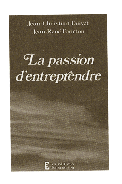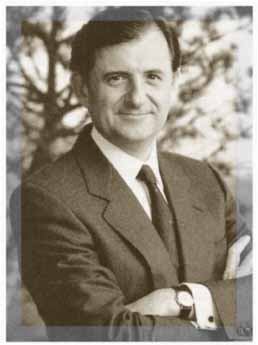The Passionate Leader: An Interview With Jean Rene Fourtou
(originally published by Booz & Company) The head of Rhone-Poulenc, France's chemical giant, puts great store in bringing 'a sense of passion' to the leadership of a company. People need 'to be active, to make decisions, to be empowered, to have life,' he says. Since his appointment as chairman and chief executive of Government-owned Rhone-Poulenc in 1986, he has instilled such vitality into the company that it has been successfully privatized and transformed into a global powerhouse with $17.3 billion in annual revenues.
The head of Rhone-Poulenc, France's chemical giant, puts great store in bringing 'a sense of passion' to the leadership of a company. People need 'to be active, to make decisions, to be empowered, to have life,' he says. Since his appointment as chairman and chief executive of Government-owned Rhone-Poulenc in 1986, he has instilled such vitality into the company that it has been successfully privatized and transformed into a global powerhouse with $17.3 billion in annual revenues.
In this interview with Strategy & Business editor Joel Kurtzman, Mr. Fourtou recalls how his philosophy began to form when he was a consultant (he became C.E.O. of the largest French consulting firm at 32). He realized his success arose not only from his ability to sell management ideas but also from his knack of keeping relationships going. He was able to give people a passion for the work they were doing; in other words 'they were happy and, as a result, they were more active, more competitive, more energized.'
So when the Government asked Mr. Fourtou to run Rhone-Poulenc, he was ready to bring 'a sense of empowerment into the big company.' Senior managers were encouraged to buy shares equal to one year's worth of compensation; high-level management meetings were organized three times a year. Mr. Fourtou also forged what he calls 'family linkages' by bringing together from around the world all the people at Rhone-Poulenc with common professions or specialties, such as the company's lawyers or members of its ethical pharmaceutical businesses. People who work for Rhone-Poulenc are members of a community, he says. 'As members of a community, they have leverage to do things they could not do on their own. They can get things accomplished here.
Jean-René Fourtou, chairman and chief executive of Rhône-Poulenc S.A., one of France's biggest companies, spent the first 20 years of his career at Bossard, a large French consultancy, where he specialized in the chemical and pharmaceutical industries. In the early 1980's, he wrote a report on the chemical industry's future in France that caught the attention of the Government, which controlled Rhône-Poulenc at the time. Because of Mr. Fourtou's expertise, and because of his report, he was asked by the Government to run Rhône-Poulenc. He became its chairman and chief executive in 1986.
Soon after taking over, Mr. Fourtou, who is now 57 years old, began to transform the company. Not only did he revamp and decentralize the management system, but he also worked to change the culture and make the company more global. Mr. Fourtou quickly began selling off poorly performing businesses while buying new businesses that matched his growth-oriented global strategy.
Before his first year in office had ended, Mr. Fourtou launched his American initiative. In rapid succession, Rhône-Poulenc bought Union Carbide's agricultural chemical operations and Stauffer Chemical's industrial chemical business. Then, at a cost of $2 billion, Rhône-Poulenc merged its pharmaceutical operations in the United States with Rorer, the American drug company, to form a new business, with a 68 percent equity position by Rhône-Poulenc. Mr. Fourtou also created a partnership between Merck & Company in Europe and Rhône-Poulenc's Pasteur Merieux vaccine business, and he invested heavily in Asia. In 1993, Rhône-Poulenc was privatized. It now has revenues of about $17.3 billion.
Mr. Fourtou's global strategy has worked well, particularly in the United States. During his tenure, revenues from Rhône-Poulenc's American operations have increased to more than 24 percent of the company's total, from just 3 percent. Overall revenues from outside France now account for the bulk of the company's business -- a full 75 percent, compared with less than 25 percent when Mr. Fourtou took over. Indeed, under his leadership, Rhône-Poulenc has become one of France's most global companies.
But Mr. Fourtou, who was educated at France's prestigious -- and traditional -- L'École Polytechnique, is anything but a conventional leader. He believes in people over systems, in the acceptance of tension within a company and in individual initiative. Mr. Fourtou -- who reads philosophy and once had a philosopher on the staff of his consulting firm -- was creating an "empowered'' work force at Rhône-Poulenc long before the term became popular.
What follows are excerpts from a conversation with Strategy & Business that took place recently in Mr. Fourtou's office in Paris.
S&B: A few years ago, you co-authored a book about business called "La passion d'entreprendre" -- the passion of enterprise or entrepreneurship. It is unusual to use the word passion in a book about business, at least in the English-speaking world, where business is thought of as analytical, precise and managerial. For the benefit of us stodgy English speakers, why the word passion?
Jean-René Fourtou: To explain, let me first provide a bit of background. Before becoming chairman of Rhône-Poulenc, I was head of the largest consultancy in France. I was only 32 years old, and I was running the firm. Now most people thought the reason I was so successful was that I was a very good salesman. But that was not really the reason. In the entire time, I never lost a client. I kept relationships going.
Now it is true that as a consultant, I was always selling -- new processes, new ideas, new strategies, new approaches, new management methods, new vocabularies, new re-engineering ideas and so on. This is what we were paid to do. But I knew that my clients were not really keeping me because of that. They were keeping me because of something else -- something additional -- that I was bringing them. Something of which I was not even aware at the time.
S&B: What were you bringing them?
Jean-René Fourtou: I was making the people I worked with happier, which made them much more active. You know, not all of my implementations were big successes. I remember once, when computers were first coming on the scene, there was an assignment with many problems. The computers did not work. But in spite of that, the client kept me. Why? Because even though we had an initial setback, they were happy and as a result, they were more active, more competitive, more energized.
You see, I have always put a lot of pressure on people not simply to obey, but instead to be active, to make decisions, to be empowered, to have life. So, as a result, as a consultant I got some really enormous results. And afterward, the clients would say, "My goodness, how this guy works!" So I realized that as a consultant, what I was really bringing to a company was a new sense of vitality -- a sense of passion -- and that this was what was changing people. I believe very strongly that good management cannot compensate for a lack of vitality.
S&B: How do you create that passion?
 Jean-René Fourtou: First, you have to empower people and you do that by sharing. You have to share vision, share values and share objectives. You have to bring people together, which I would do. For example, I used to go to football or rugby games with my clients and I used to succeed in bringing both the chairman and the workers to the games. We would sit together and eat together. I mean, I would just go up to them and say, "Are you coming with me to see Scotland versus France?"
Jean-René Fourtou: First, you have to empower people and you do that by sharing. You have to share vision, share values and share objectives. You have to bring people together, which I would do. For example, I used to go to football or rugby games with my clients and I used to succeed in bringing both the chairman and the workers to the games. We would sit together and eat together. I mean, I would just go up to them and say, "Are you coming with me to see Scotland versus France?"
I would say that to the worker and to the chairman alike. In my opinion, problems started in companies when the workers and the C.E.O.'s stopped sitting together, stopped eating together, stopped sharing.
But I must tell you, you cannot have empowered people without also having tensions. You have to live with tensions, you have to accept tensions. But it is more important to have people empowered and sharing visions and objectives than it is to have tranquillity.
S&B: So a certain measure of conflict is acceptable within companies?
Jean-René Fourtou: Oh, yes. When there is conflict, there is vitality. But conflicts must be managed and there must be procedures for managing them -- even for measuring them -- inside the company. This is needed so that the conflict is creative.
When I was a consultant, we invented a way of looking at degrees of conflict and harmony and of plotting them on a grid that has synergy on one axis and antagonism on the other. We separated the matrix-grid into 16 different boxes, each of which represented a type of relationship between these two extremes. Using this grid, we were able to explain to people the kinds of relationships they were having inside their organizations and we were also able to train people.
With that knowledge, you can help people to move from one kind of relationship into another and to manage the tensions and conflicts. As a result, we were able to create conditions where there was more vitality and where people take responsibility. We trained more than 5,000 people in these techniques.
S&B: Is passion enough?
Jean-René Fourtou: You must be skillful, you must be organized, you must have a system -- a system that is really perfectly suited for your company -- and, of course, you need management and computer systems and concepts. But, by the same token, if all you have are procedures and concepts and computer systems, then you kill the organization and you kill the spirit of the people who work there. You need a balance between order and disorder. But there must also be a tension between them -- a creative, vibrant tension.
S&B: Have you brought these techniques to Rhône-Poulenc?
Jean-René Fourtou: Well, many of these ideas were developed for the consulting firm, where people are partners, where they have to be consulted, where they need to be regarded for their ideas. That place, I thought at first, was a different environment from an industrial firm with manufacturing plants, huge budgets and a large scale.
But I decided to try anyway to bring a sense of empowerment into this big company. I decided to make the top managers feel like partners, like a community of shareholders. So, in my second year here, I proposed to the senior managers that they all buy shares. And they did. These managers all agreed to buy shares equal to one year's worth of compensation. It was a huge commitment, which we were able to help by offering financing. But I wanted them to reach, to change, to feel like partners.
Almost immediately, I noticed a change in the relationships between the people in this group. I noticed it more internally than I did in their relationships with the outside. The goodwill was huge, the community feeling grew, the exchanges between people intensified and became more creative.
But while feelings changed, the funny thing was that not that much changed with respect to having people focus on profits and the value of their shares. They grew closer, but surprisingly, they did not focus more on profits.
S&B: Why was that? A number of important studies suggest that if people have a stake in the enterprise, they will focus their work on pursuits that increase their rewards.
Jean-René Fourtou: Well, that is the case, I suspect, in some other countries. Perhaps in the Anglo-Saxon world. The reason it did not work here, I believe, is that the French are more sensitive to issues of status, while people in other countries might be more sensitive to issues of compensation.
But while people's attention to profit did not change, what was different was that there was a new sense of community, a feeling that it was worthwhile to work together, a search for synergies and so on. They did begin to feel like partners, and that was very good.
S&B: What else have you done to create that sense of community?
Jean-René Fourtou: Three times a year, the 65 most senior managers in the company meet for two days. That is the right frequency for a meeting like this, since if you meet more often, you take away people's power. You do their work for them. You make their decisions for them. That is something I do not want to do.
Now when we all meet, I try to leave enough free time for these people to get together so that they get to know each other informally. I want them to meet informally so that they will create linkages between them, so that they will feel they are part of something. I want to do this -- enhance these feelings -- rather than work them too hard at these meetings.
One of the ways I try to build these links is over meals, which we take together. During the meals, since I am from the Bordeaux region of France, I take time to educate these managers about the wines of that region. We do that at every meal. That enables me to create a time to share and to create a sense of conviviality among these people. We want them to consult with each other on their own. To ask questions -- on their own -- when they are making decisions.
S&B: What if some of the decisions they make are wrong. What are the consequences?
Jean-René Fourtou: Well, everybody makes errors. I mean, we don't want to make errors, we don't like to make errors, but everybody makes them. Within our company, people must be able to learn from their mistakes, which means they must be very determined not to make the same error the next time.
Let me give you an example. We have made some errors in some of our early acquisitions. We have had some huge and successful acquisitions, such as those in the United States from Union Carbide. We have also had some failures, e.g., in Germany, our business processes were not working properly. We have set about to analyze these errors and understand how we came to make them, so that we will not repeat them. But we understand that no one is immune from making mistakes.
S&B: Is this analysis formalized, as are analyses carried out after an airplane accident?
Jean-René Fourtou: They are systematic, but only up to a point. And we have learned a great deal from them. I think if these analyses were too formalized and too systematic, they would scare people.
S&B: What else did you do to create a sense of empowerment and community?
Jean-René Fourtou: One of the first things I did when I arrived was to create a small executive committee of the most senior managers. One of its functions is to conduct an ongoing assessment of the company. In that assessment, we ask: What is the state of the company, what are the opportunities, what should we be doing? The aim is to find out what people want to do and then to help them do it. The purpose of this committee is not to do things. That would take away initiative from other people. It would take away the ability of other people to act, which would take away their energy. So we assess the company and set priorities. That is all.
You see, my philosophy is that, to get things done, you have to build common understanding, objectives and vision so that initiatives are undertaken naturally, rather than imposed.
This executive committee also insures that I am not alone, that I am sharing with other people in the company, that I have my own linkages. This committee meets once a month.
S&B: You mentioned linkages. What do you mean by that term?
Jean-René Fourtou: One of those linkages is what we call "family linkages." For example, all of our scientists within all of our businesses are in one family. All the lawyers are in a family, the finance people are in a family and so on. All of the families meet at least once a year. They come together. We want people spread through all the businesses so that there is a richness of competencies throughout each of the businesses. But we also want them to have links to one another.
S&B: "Communities of practice" is how this is beginning to be referred to in the academic literature.
Jean-René Fourtou: I would rather call it "communities of people sharing practices." What is important here -- more than the practices -- is the people, their feeling of empowerment and their vibrancy. The sharing of understanding, of vision. These are as important as the unity of the group and its cohesion. And, of course, it is important that there is unity and a sense of sharing and that this comes naturally from feeling that one is an individual, but also a member of a group. This cannot be imposed from some central authority in the organization. It is a matter of feeling deep linkages between people.
People also come together as members of specific businesses and as members of businesses in particular countries. These are also links. So people come together as members of the ethical pharmaceutical businesses, the vaccine businesses, the agrochemical businesses, the environmental businesses, the chemical businesses, the food additives businesses and so on. This is key because each business has certain factors of success. Since we are in worldwide businesses, where innovation is key, we need to know exactly what is emerging around the world, what our competitors are doing. This is all done vertically, along the lines of the particular business structure.
S&B: What you are saying sounds very well suited to operating in a global environment. But how do you know whether you are succeeding? How do you measure success?
Jean-René Fourtou: We have two types of measures. First, we have financial measures, which are needed in a decentralized, empowered organization. Good numbers and good information are needed by the person who leads the business in a country and whose performance is going to be judged in the end. Everyone shares the same concepts by which we make our financial consolidation.
We try to measure innovation, which is different from business to business. We measure market share. In some businesses, we measure the costs of raw materials. We measure capital employed and profit. We are also beginning to measure economic value added -- E.V.A. -- worldwide. Right now, we only do it in our agricultural products businesses. But that measure is used globally. If you go to the agriculture business in Bolivia, everyone understands E.V.A. If you go to France, they know it. Eventually, when E.V.A. is rolled out around the world for all the businesses, there will be a single, unified set of economic definitions.
These economic objectives are very important, but we also have other priorities. I try to push everybody to prioritize and to make an evaluation and recommendation regarding their own priorities. If you have too many priorities you are not effective, but it is the job of management to help people define their priorities and then help them see how they measure up against them.
S&B: Do you use a scorecard to chart these priorities?
Jean-René Fourtou: No. There can be no single set of priorities. You cannot have one single scorecard because you cannot talk to people everywhere the same way. You cannot, for example, talk to the Americans the way you talk to the Japanese. So you cannot have the same priorities for all.
Now, having people set their own priorities for their work requires that these people have a strong sense of virtue. That they are responsible, active citizens, in a way. Unfortunately, this is tiring for some people. Many people still prefer to obey directions, rather than set their own course. It takes energy to set your own course. It takes freedom. It takes a tolerance for ambiguity. Not everyone has these qualities.
S&B: Does this system work as well everywhere?
Jean-René Fourtou: No. It works differently inside each business, and inside each country. It also depends on whether a market is new or old. The priorities and ways you manage a business in China are different from the way you do it in the United States or Germany.
S&B: Is there a single culture at Rhône-Poulenc?
Jean-René Fourtou: We try to have respect for people and their contributions. That is part of our culture. And people have a sense of security working here, though it differs in each country. But most of all, there is a sense that when they work in this company, they are members of a community. As members of a community, they have leverage to do things they could not do on their own. They can get things accomplished here. Within that community, people feel -- or they should feel -- responsible and empowered and respectful of each other as individuals.
Here is one example of our culture. In our organization, we don't say that "at a meeting it was decided." Meetings don't decide. People decide. Here it is always a person, an individual, who makes a decision and who is responsible for that decision. That person, of course, makes the decision by asking other people and by seeking their consultation. That person has to inform everyone of the decision. Here, people are responsible, not groups. We are a company of individuals first, who all feel that they are part of the group. ![]()
Reprint No. 96304
| Authors
Joel Kurtzman, Joel Kurtzman is editor-in-chief of Strategy+Business. |




